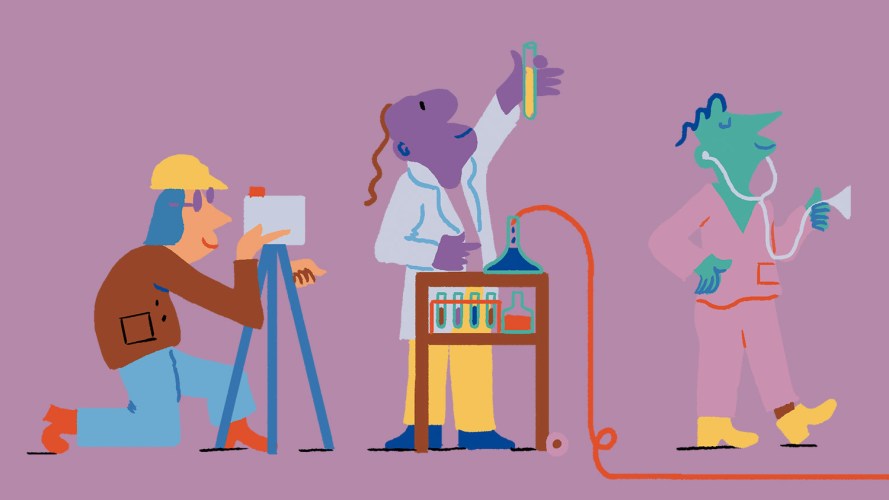Customers Want Your Business to Engage More on Social Issues, Not Less



People want businesses to lead with ethics, according to Edelman's latest Trust Barometer. Here's how you can do that in a way to increase and build customer trust.
Are people growing tired of big business? Tonia Ries, who started work on this year’s Edelman Trust Barometer, now in its 22nd year of measuring public trust across major institutions, had a hunch they were. On top of that, she sensed they were becoming wary of celebrity CEOs wading too far into social issues, which seemed to undercut how businesses could build customer trust.
Other accounts seemed to support the hypothesis by Ries, who serves as executive director of intellectual property at the Edelman Trust Institute. One Harvard Business Review study from early in the pandemic found that people were developing “statement fatigue,” or an increased aversion to empty-seeming social justice announcements from corporations. A Newsweek op-ed a few months later warned business leaders it’s risky to hire a woke CEO.
“We asked people if business has overstepped its bounds, if companies are too far over their skis,” Ries said. “I was stunned to find that on every issue, people want business to engage even more.” In fact, fewer than 10% of respondents around the world believe that business is overstepping.
Join Team Earth
Whether you are a CEO or just starting your career, you can use the power of business to create a more inclusive and sustainably run world — for everyone.



The shift from doing well to doing good
When people say they “trust” business, they are referring to two specific attributes: competence and ethics. One of these is old news. Over the years, the Edelman Trust Barometer has consistently found people perceive business as more competent than government, reporting much higher confidence in the business community’s ability to get things done — effectively and efficiently — than in any other major institution.
The thing that stood out this year, though, is growth on the flip side of the coin: the ethical component. Now, people are expecting companies to do the right thing ethically to help build customer trust.
“The dimension of trust that has historically pulled business into the lead is competence. That has always been there,” Ries said. “But we’ve now strengthened the ethical dimension and taken that from a negative to a positive.”
An institution’s ethics hinges on a number of questions: Does the institution serve a positive force in society? Does it keep the promises it makes? Is it dependable as a force for good?
“The conversations companies have had around engagement with societal issues, around thinking more long term in terms of serving many stakeholders, around approaches to business strategy — all of those things are paying off,” said Ries.
But before business leaders jump out of their seats to take a victory lap, Ries warns about one major ethical question that’s stubbornly lagging behind the others: Does the institution serve everybody’s needs equally and fairly?
“Business has moved the needle on all of them in the right direction,” said Ries. “But it still has some work to do on fairness.”
Go net zero now
Carbon reduction is just the beginning. With Salesforce Net Zero Cloud, you can integrate a complete sustainability management solution into your organization. Change is within reach.



Trust is plentiful but selectively applied
This year’s Trust Barometer also highlighted people’s ability to be flexible and adapt to new working circumstances, and shed light on how narrow our trust aperture has become.
With so many of us working virtually, it’s not uncommon to have colleagues you’ve never met in person. There’s good reason to speculate whether that would weaken the bonds people have with their coworkers. The data found the opposite to be true.
“We have less trust for foreigners and people in other states or regions of our country,” Ries said. “We have more trust and closer bonds with friends and family, closer bonds with neighbors, but we also have even closer bonds with our coworkers. The local nature of trust, I think, has become stronger and stronger.”
3 takeaways to help your business build customer trust
The Edelman Trust Barometer details a number of strategies businesses can take to fill the trust vacuum in society. Ries offered three of her own:
Align your purpose with your business
Whatever social issue you stand with must have a clear connection to your business, Ries said. Very often, businesses approach Edelman and ask for help choosing ways to engage socially and actions to pursue, knowing full well they can’t do everything. Ries asks them to think about the issues and problems closest to the community the business serves.
Start small and local
You can often get more done by starting locally and small than by trying to find world peace in one go, Ries said. This is especially important considering the Trust Barometer’s finding that so many people view trust through a hyperlocal or community-based lens. Tap into that power and find ways to take action one step at a time, Ries advised. You’re more likely to pick up small gains and wins along the way that demonstrate progress, which in turn will restore faith in the system and in your ability to get things done.
Listen first
“One of the most surprising pieces of advice we so often give people is not to say something,” Ries says. Businesses often need to hear from firms like Edelman that they’re better off not saying anything on a particular social issue until they have actually done something about that issue. “Action has to come before talk because without action, your talk will not be credible,” Ries said.
Ultimately, business is in the enviable position of enjoying a surplus of trust, especially as that trust erodes among all other major institutions. Business leaders have the opportunity to flex their competence and their ethics to a more receptive public. The cost of squandering it is unimaginable.
“If we allow this cycle of distrust to continue, we really are at risk of a great deal of instability,” Ries says. “There’s a lot of upside and opportunity for business, but I think there’s also some downside of not taking action. I don’t think it’s an option for business to put its head in the sand and ignore these issues.”
The new tech driving Formula 1®
Feel like you need to know your customers better? So did Formula 1. Here’s how the fast-growing sport is using tech to connect with a younger, more diverse fan base.




























